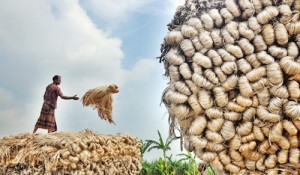COMPAT by its order dated July 1, 2016 has over-ruled the order of CCI wherein the Indian Jute Mils Association (IJMA) and Gunny Trade  Association (GTA) were penalized for alleged cartelization in pricing of jute bags. It was alleged that the jute manufacturers have acquired a monopoly position as a result of the circular of the Government under the Jute Price Maintenance Act, 1987 that 100% sugar to be produced by the sugar factories is to be mandatorily packaged in the jute bags (A-Twill type). Taking advantage of this monopoly, the jute mills have unreasonably hiked the prices of jute bags from INR 53.50/bag in April 2010 to INR 64.50/bag in February 2011. It was alleged that this increase was possible only because of an agreement/understanding among all the members of the IJMA and GTA, who were quite conscious of the fact that they enjoy complete monopoly. Thus, it was alleged that, IJMA/GTA have cartelized the market for packaging material for sugar thereby infringing Section 3(3) of the Act by jointly deciding sale prices and limiting technical development of the industry. The CCI considered the same as prima-facie violation of Section 3(3)(a) of the Act and ordered an investigation into the same.
Association (GTA) were penalized for alleged cartelization in pricing of jute bags. It was alleged that the jute manufacturers have acquired a monopoly position as a result of the circular of the Government under the Jute Price Maintenance Act, 1987 that 100% sugar to be produced by the sugar factories is to be mandatorily packaged in the jute bags (A-Twill type). Taking advantage of this monopoly, the jute mills have unreasonably hiked the prices of jute bags from INR 53.50/bag in April 2010 to INR 64.50/bag in February 2011. It was alleged that this increase was possible only because of an agreement/understanding among all the members of the IJMA and GTA, who were quite conscious of the fact that they enjoy complete monopoly. Thus, it was alleged that, IJMA/GTA have cartelized the market for packaging material for sugar thereby infringing Section 3(3) of the Act by jointly deciding sale prices and limiting technical development of the industry. The CCI considered the same as prima-facie violation of Section 3(3)(a) of the Act and ordered an investigation into the same.
The DG Report submitted after detailed investigation found that IJMA and GTA are utilizing their platform to discuss the jute bags prices to be published to discuss the jute bags prices to be published in the GTA Daily Price Bulletin (DPB) clearly indicate the involvement of IJMA in fixation and publication of prices of jute bags.
The CCI agreed with the findings of the DG, primarily, based on the fact that a comparison of A-Twill jute bags with B-Twill had no correlation with each other despite the basic material and production cost remaining the same. In fact, the price of A-Twill bags on per gram basis was found higher by approximately 50% compared to that of B-Twill Bags. The actual transactions in the market were taking place almost near to the DPB price meaning thereby that the DPB prices were actually being followed. Such conduct of IJMA and GTA was held to be in violation of Section 3(3)(a) and Section 3(3)(b) of the Act. The CCI penalized IJMA and GTA at the rate of 5% of their average turnover for the past three years. The total amount of penalty payable by IJMA was indicated as INR 768527/- and on GTA as 35169/-. Similarly, the CCI also imposed a penalty on 25 members of IJMA and 19 members of GTA@ 5% of their average income of the last three financial years.
In the appeals, the COMPAT noted that the participation of Mr. U.C. Nahata, one of the members who joined the CCI more than three years after filing of the case, in the decision making of the CCI in the present case had vitiated the order due to violation of principles of natural justice as he was not part of earlier hearing in the CCI. On the merits of the order, the COMPAT noted that neither the DG nor the Informant could collect any evidence to show that there was an agreement between GTA and IJMA about fixation of price of A-Twill jute bags or that the price of such bags was fixed by GTA after discussion with IJMA. The CCI did not independently analyze the findings of DG and mechanically approved the findings. None of the correspondence referred to between IJMA and GTA show that they had entered into an agreement for increase in prices of A-Twill bags. Further, the comparison of A-Twill and B-Twill bags for faulty as the A-Twill bags were of 1190 gms. as compared to B-Twill bags of 665 gms. The COMPAT held that the finding of violation of Section 3(3)(a) and 3(3)(b) were unsustainable and deserved to be set aside.
Lastly, the COMPAT also held that the penalty imposed on IJMA and GTA (at the rate of 5% of the average turnover of the past three years) is disproportionate and without setting out cogent reasons. The COMPAT sets aside the order of the CCI and the penalty imposed on IJMA and GTA.
(Source: COMPAT order dated July 01, 2016)
Suggested Reading:
(i) COMPAT sets aside CCI’s penalty on Alkem Laboratories for indulging in anti-competitive practices-
(iii) Bid-Rigging in Public Procurement: Some evolving trends in Indian Competition Law
(v) COMPAT sets aside order against Cement Cartel







